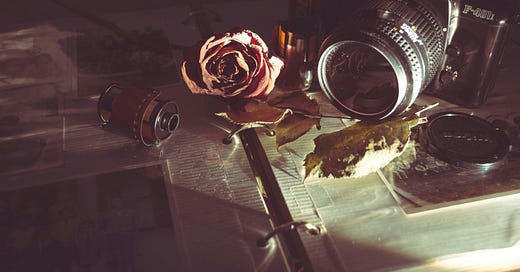Beauty and Bombs
“The world is a cathedral of contradiction—every love-stained-glass sits beside a cracked pane of sorrow.”
Dear Bata,
I decided to write to you today because I know you are grieving.
Your Ma said you lost Milo, your Labrador retriever. She said you keep recounting the affectionate moments you had with him—how he nosed your hands for attention, how he lay down close during naps, gently resting his head on your legs, how he reared on his hind legs every time you walked through the door, his body dancing with excitement.
My dear Bata, the world is an oxymoron, a catalogue of beauty and bombs.
And we will all, at some point, experience this pain.
Our Pa used to say, whenever he could no longer stand our mischief—particularly my bad behaviour—
“Everybody’s own is waiting for them up there.”
He was alluding to a future time of facing difficult parenting, when life would inevitably throw at us the same troubles it had thrown at him and those before him. He would point to an imaginary tree, and your Ma and I would look at each other and giggle.
We giggled at how sweet our Pa looked with his white teeth and big glasses. We giggled at how old-fashioned he sounded; how clueless we thought he was.
Because as far as we were concerned, the only thing waiting for us “up there” was freedom.
We imagined adulthood like a prelapsarian Eden—flooded with sunlight, golden and warm. We could munch as many apples as we wanted. Sleep till noon. Play until we literally dropped. We thought the future was a feast: a decadent, sprawling mountain of chocolate and sugar and cola.
But then we grew up.
And we realised Christ was right when He said:
“In this world, there will be trouble…” (John 16:33a)
There were accidents.
Betrayals. Pain. Rejections. Hardship. Want. Ignorance.
Near-death bus crashes. Sickness. Death.
There were bombs.
But there was also beauty.
Victories. Breakthroughs. Mercy so tender it made us weep.
And the height of it all? Your birth.
Do you remember when I took you to the Emirates to watch Arsenal play Liverpool? That year when we needed just four extra points to make the Champions League.
We ate salty chips from the chippy during half-time, and I worried the chicken was slightly pink. But then we realised it was only because we were wearing pink glasses.
Hahaha! How goofy it all was.
Back in the day when I still held that ridiculous hope that you’d love football, support Arsenal, cry buckets if we lost (which, as you know, we often do). That weekend was a good one. You had hot chocolate afterwards, and a doughnut. And although we lost the game, you tried to make me feel better by saying we’d win next time.
Diogo Jota scored that day. And today, I found out he died in a car crash alongside his brother. Only recently married. Three children.
His Instagram page still gleams with wedding photos and fairy lights.
And now, funeral pictures will sit side-by-side with the joy.
My dear Bata, the world is a cathedral of contradiction—every love-stained-glass sits beside a cracked pane of sorrow.”
The world is inexorably tied to these twin forces.
And as long as we reside on this earth, we are fated to navigate its jagged boundaries.
The Oxford Mathematician and Christian apologist John Lennox often speaks about this paradox—exploring the age-old question: How can a good God allow so much grief?
Lennox reminds us that the existence of beauty—sunsets, music, love, laughter—is not cancelled out by suffering. Rather, the two live side by side in what he calls “a broken yet breath-taking world.”
It behoves me to end this letter with hope.
Like David does in his Songs of Ascent, where each lament rises toward praise—like feet climbing a steep, holy hill, trembling but ascending.
We all agree that death comes to us all.
And for all our science and smarts, we still have no cure for it.
But we do have a Saviour who has stared it down and stood up again.
So, what do we do? Or, as Lenin famously wrote: What is to be done?
What can be done so that your heart does not fail?
So it does not fall to the ground like an untended prayer?
So you don’t wake each morning to the grey ache of despair?
Richard Dawkins argues that we are simply to survive and replicate.
To pass on our genes. To follow the indifferent logic of DNA.
Others shrug: “Na so life be.”
As if the inevitability of grief means we should sit down inside it and build no hope.
But Christ—Christ says something different.
He acknowledges it plainly:
“In this world, there will be trouble.”
But—
Ah! The delight of but.
That small, subversive word.
It undoes the sentence before it.
It disrupts despair.
It’s the interruption in a world that keeps announcing our defeat.
It tells you:
Your story does not end with trouble.
So, I will finish Christ’s quote from John 16:33:
“In this world, you will have trouble.
But take heart—
I have overcome the world.”
Greet your Ma.
With love always,
Your Auntie,
Bassey
A Thought to Leave You With
Where are you still waiting for joy to rise again beside grief?





Nice
Beautifully written reflection on life's contrasts. The letter's message of hope and resilience in the face of adversity is truly inspiring.